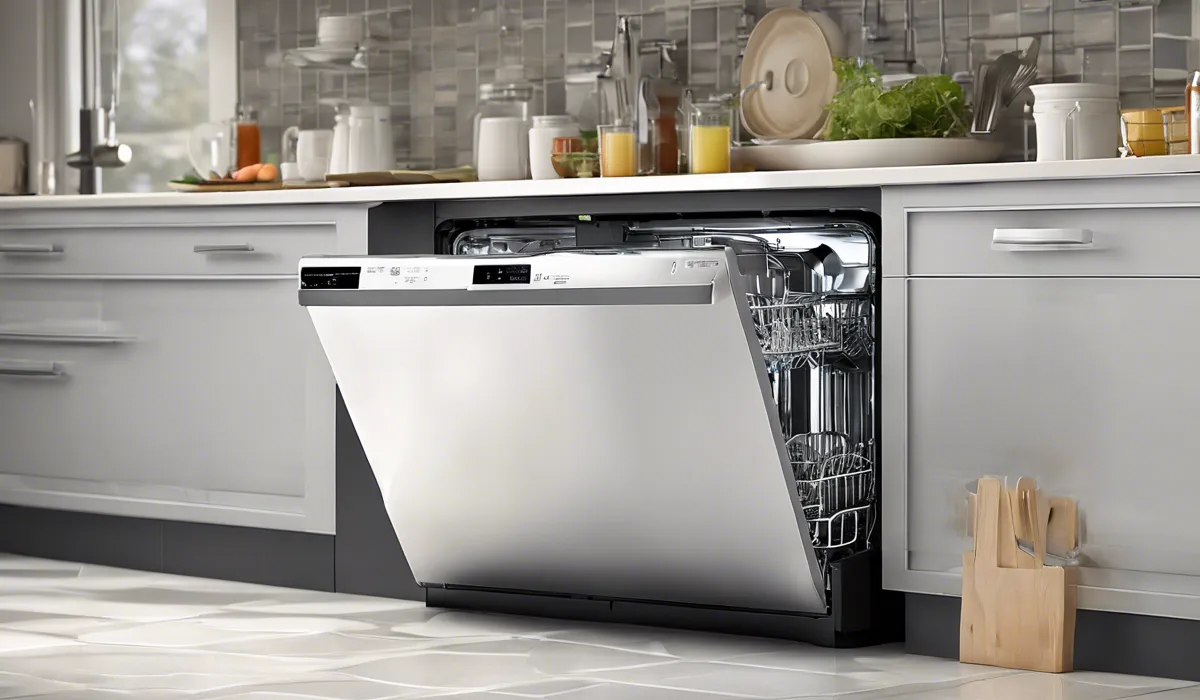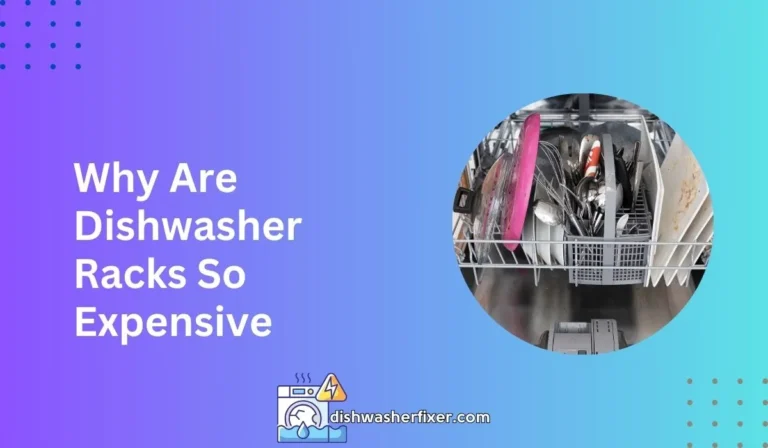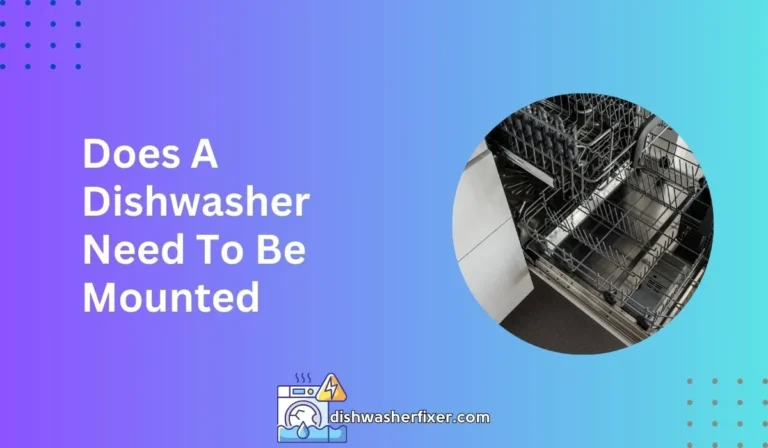Can Dishwasher Leak When Not Running? Uncover Hidden Causes!
Yes, a dishwasher can leak when not running. This may occur due to worn gaskets, a faulty door seal, or a damaged valve. Standing water in the dishwasher’s base from a previous cycle can also lead to leaks. Regular maintenance is recommended to prevent such issues.
Causes of Dishwasher Leaks When Not Running

Worn-out or Damaged Door Seals
One common reason your dishwasher might be leaking when not in use is due to worn-out or damaged door seals.
Over time, the rubber gasket that lines the door of your dishwasher can become brittle and crack, leading to water seeping out.
This is especially likely if you notice water pooling under the door of your dishwasher. Regular inspection of the door seals can help catch this problem early.
Loose or Damaged Valves and Hoses
Another potential cause for leaks is loose or damaged valves and hoses. Your dishwasher has several hoses connected to it, such as the water inlet hose and the drain hose.
If either of these becomes loose or is suffering from wear and tear, they could be the culprit. Valves are equally important and if they fail to close properly, water may leak out.
Ensuring that these components are securely connected and in good condition is crucial to prevent leaks.
Faulty Pump or Pump Seal
The pump is an essential part of your dishwasher, circulating water and directing it to the drain. If the pump or its seal is faulty, water can leak out even when the dishwasher is not running.
This might be due to a malfunction or simply the result of normal wear and tear over time. Checking the pump and its seal should be part of your routine maintenance to avoid leaks.
Issues with the Dishwasher Tub
A less common, but more serious issue might be with the dishwasher tub itself. While designed to be durable, the tub can develop cracks or holes after prolonged use or if it has been damaged by objects that were too sharp or heavy.
This kind of damage can lead to leaks and may require a professional repair or even replacement of the tub.
Troubleshooting Steps for Identifying the Leak Source

Inspecting the Door Gasket and Seals for Wear and Tear
To determine if the door gasket is the source of the leak, inspect it for any signs of damage such as cracks or gaps.
If you notice any issues, replacing the door seal is a simple fix that can often be done without professional help. Remember, a secure seal is vital for keeping water inside the dishwasher.
Checking Water Inlet and Drain Hoses for Secure Connections
Loose connections can cause leaks. Make sure that all hoses are securely fastened and check for any signs of damage or wear.
If a hose is damaged, it should be replaced promptly to prevent further leaking. This is a task that might require some basic DIY skills but is generally straightforward.
Examining the Pump and Pump Seal for Damage
If you suspect the pump might be the issue, carefully examine it and the seal for any signs of damage.
A damaged pump will typically require replacement by a professional, but a pump seal might be something you can replace on your own. Check your dishwasher’s manual for guidance on how to access and inspect these components.
Inspecting the Dishwasher Tub for Cracks or Holes
Inspect the dishwasher tub thoroughly for any visible signs of damage. Even small cracks or holes can lead to leaks.
If you find any damage, it is best to call in a professional as this is a more complex repair that might involve removing the dishwasher and dismantling parts of it.
Preventative Maintenance and Solutions

Regularly Cleaning and Maintaining Door Seals
To extend the life of your door seals and prevent leaks, clean them regularly using mild soap and water. This will remove any debris that might cause the seal to degrade over time.
Checking the seals for damage and replacing them as soon as you notice any issues can save you from unexpected leaks and water damage.
Tightening or Replacing Hoses and Valves as Needed
Periodically check the hoses and valves for any signs of damage or loose connections.
If you find any issues, tighten the connections or replace the defective parts to ensure a watertight system. This is a simple but effective way to prevent leaks from occurring.
Servicing or Replacing a Faulty Pump
If your pump is the issue, it may require servicing or replacement. This can be a complex task, often best left to professionals. Regular maintenance checks can help you identify pump issues before they lead to leaks, saving you time and money in the long run.
Repairing or Replacing the Dishwasher Tub
If you find that your dishwasher tub has been compromised, it is crucial to address the issue immediately.
Depending on the extent of the damage, this might involve patching up small cracks or replacing the tub entirely. This kind of repair is significant and will typically require professional assistance.
If you find your dishwasher leaking when it’s not running, it’s important to investigate the common causes such as door seals, valves, hoses, pumps, and the tub itself.
FAQs About Dishwasher Leaks When Not Running
Can a dishwasher leak if it’s turned off?
Yes, a dishwasher can leak even when it’s turned off, often due to issues like worn gaskets or a faulty door seal.
What causes a dishwasher to leak when not in use?
A dishwasher can leak when not in use due to worn out gaskets, a damaged door seal, or a malfunctioning valve. Standing water from a previous cycle can also cause leakage.
How can I prevent my dishwasher from leaking when it’s not running?
Regular maintenance, including checking and replacing worn gaskets, seals, and valves, can help prevent your dishwasher from leaking when not in use.
Is standing water in the dishwasher base a sign of a potential leak?
Yes, standing water in the dishwasher’s base can indicate a potential leak and should be addressed to prevent water damage.
What should I do if my dishwasher is leaking while not running?
If your dishwasher is leaking while not running, inspect the gaskets, door seal, and valves for damage and contact a professional for repair if necessary.
Final Thoughts
Dishwashers can indeed leak even when not in use, primarily due to wear and tear on components like gaskets, door seals, or valves.
Residual water from past cycles also poses a risk for leaks. To avert potential damage, it is advisable to adhere to a schedule of regular maintenance and checks.





